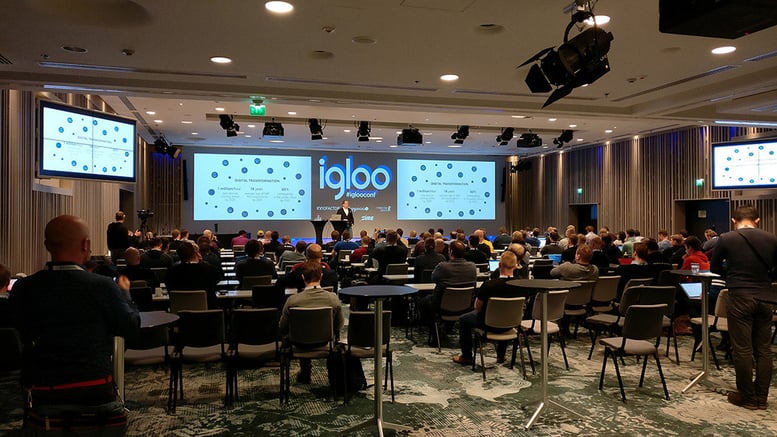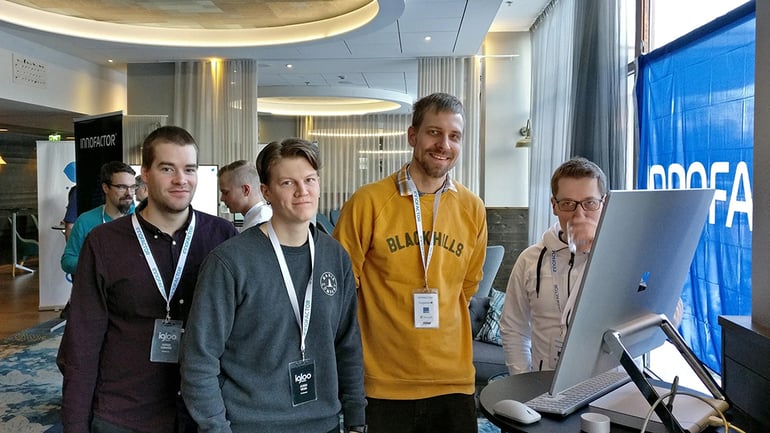Pinja’s task force attended IglooConf, now taking place for the third time, to listen to Azure stories. The two-day event is organized by Finland Azure User Group featuring presentations by international speakers on the utilization of the Azure cloud service as virtual server platforms and development environments. The speeches included examples, empirical stories and speculation on the future of Azure.

The speeches included examples, empirical stories and speculation on the future of Azure.
What was the contribution of presentations?
The best contribution of the event consisted of finding new tools for the development, better utilization of old tools, and networking. Azure offers hundreds of services. It is quite natural that mastering all these is challenging, if not impossible, at least if striving to gain deeper understanding.
Of course, deeper understanding of all these is not mandatory, nor is it the object of the events. When designing solutions, however, it is important to be aware of the possibilities that are available and the type of problems that can be solved with them. While part of the available services can theoretically solve the same problems, some of them are better suited or more cost-efficient than others.
Amidst a multitude of efficient services, it is easy to forget that they must also be mastered. Magnusson’s presentation dealing with Azure’s best practices provided ideas for development to our own Azure environments. Of course, integrating these practices into our development processes requires cooperation with the IT department and more accurate definition of the processes.

A part of Pinja’s task force.
Why was the event worth attending?
Our team attended the event because Azure’s services have a significant role in our current projects and most likely also in future ones. We were particularly interested in better use of SignalR and Service Bus, having faced challenges with these.
Utilization of the Function App in short but relatively heavy computation is also a part of a current project, where serverless computing can solve the problem more cost-efficiently than other services. We were also interested in machine learning and artificial intelligence, although this time these were discussed in one presentation only.
Below are three samples of the presentations selected by our task force. The samples emphasize particularly communication with which we have encountered various problems during projects.
Three important samples
- Brady Gaster – SignalR: Real-time for All the Things
The presentation dealt with SignalR and the Azure SignalR Service with examples. Certainly, we were partly familiar with the topics of the presentation; however, we were interested particularly in the use of the Azure SignalR Service, since SignalR has a very central role in our current project. - Sean Feldman – Azure Service Bus .NET Standard: show must go on
Azure Service Bus, in addition to SignalR, is another communication component used in the project. One challenge here is the .NET framework version of the system’s On-Premises component, which cannot have been updated because of library dependencies. Since this restriction did not exist in the new parts of the system running under Azure, we could take a newer version into use. A problem that appeared here was .NET Standard and compatibility of older Service Bus libraries dealt with in the presentation. - Dan Rosanova – Messaging and Serverless – the cloud native future
This presentation dealt with Azure’s view on serverless computing and messaging. For services, Rosanova focused on Azure Functions, Event Hub and Azure Container Instances and their interaction.
Read more
Impressions from SymfonyCon 2018
Resources gained from Microsoft TechDays – what is the direction of development for tools and platforms?
Lessons learnt in Romania: a fresh wind for the Symphony PHP framework
Digital transformation takes away even code creator jobs
Back to the Pinja Blog
Categories
- Career at Pinja (68)
- Manufacturing (46)
- Knowledge Management (45)
- Production Development (44)
- Software Partnership & Tools (42)
- Sustainability (37)
- Wood and Forestry (37)
- Bioenergy and Recycling (29)
- IT Support and Outsourcing (24)
- Ecommerce (23)
- Maintenance (22)
- Artificial Intelligence and Machine Learning (15)
- Public Services (9)
- Compliance (1)
